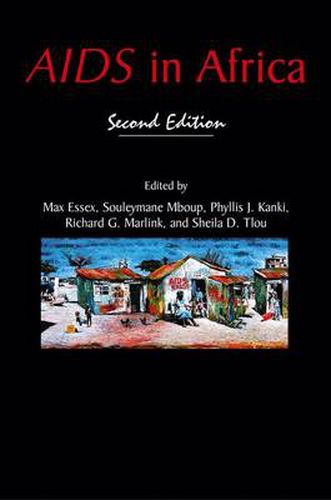Readings Newsletter
Become a Readings Member to make your shopping experience even easier.
Sign in or sign up for free!
You’re not far away from qualifying for FREE standard shipping within Australia
You’ve qualified for FREE standard shipping within Australia
The cart is loading…






This title is printed to order. This book may have been self-published. If so, we cannot guarantee the quality of the content. In the main most books will have gone through the editing process however some may not. We therefore suggest that you be aware of this before ordering this book. If in doubt check either the author or publisher’s details as we are unable to accept any returns unless they are faulty. Please contact us if you have any questions.
In the face of a grave lack of resources to fight the AIDS epidemic in Africa, practical medical education must play a critical role in curtailing the number of new cases and improving quality of care for those already infected with HIV in 2002. Although there are many AIDS experts in Africa and a substantial body of knowledge about the epidemic, networking is often compromised due to limited infrastructure and technology. Existing definitive clinical reference books on AIDS focus on the syndrome as it is understood and treated in countries with highly developed health care systems and policies, excellent medical training, and easy access to breakthrough treatments; much of the information contained in such textbooks is unfortunately irrelevant in the context of AIDS in Africa. This second edition of Aids in Africa includes an extensive update of the magnitude and nature of the epidemic, as well as regionally specific information on pathogenesis, diagnosis, epidemiology, treatment, pediatric infection, vaccine development, socioeconomic impact, and ethical considerations and include vital topics such as: prevention methods, from chemoprophylaxis to behavioral modification and education; the supportive responsibilities of industrialized countries; and the successful mobilization of local infrastructure and community leaders to implement regionally appropriate AIDS care programs. A review of Africa’s experience should be valuable to health care providers, researchers, and policy planners not only in Africa but throughout the world, since Africa has had higher rates of HIV infection and more experience with AIDS than other regions. The prevalence of the virus in sub-Saharan Africa and its rapid spread suggest its greater potential for causing larger epidemics than any other HIV virus the world has experienced before.
$9.00 standard shipping within Australia
FREE standard shipping within Australia for orders over $100.00
Express & International shipping calculated at checkout
This title is printed to order. This book may have been self-published. If so, we cannot guarantee the quality of the content. In the main most books will have gone through the editing process however some may not. We therefore suggest that you be aware of this before ordering this book. If in doubt check either the author or publisher’s details as we are unable to accept any returns unless they are faulty. Please contact us if you have any questions.
In the face of a grave lack of resources to fight the AIDS epidemic in Africa, practical medical education must play a critical role in curtailing the number of new cases and improving quality of care for those already infected with HIV in 2002. Although there are many AIDS experts in Africa and a substantial body of knowledge about the epidemic, networking is often compromised due to limited infrastructure and technology. Existing definitive clinical reference books on AIDS focus on the syndrome as it is understood and treated in countries with highly developed health care systems and policies, excellent medical training, and easy access to breakthrough treatments; much of the information contained in such textbooks is unfortunately irrelevant in the context of AIDS in Africa. This second edition of Aids in Africa includes an extensive update of the magnitude and nature of the epidemic, as well as regionally specific information on pathogenesis, diagnosis, epidemiology, treatment, pediatric infection, vaccine development, socioeconomic impact, and ethical considerations and include vital topics such as: prevention methods, from chemoprophylaxis to behavioral modification and education; the supportive responsibilities of industrialized countries; and the successful mobilization of local infrastructure and community leaders to implement regionally appropriate AIDS care programs. A review of Africa’s experience should be valuable to health care providers, researchers, and policy planners not only in Africa but throughout the world, since Africa has had higher rates of HIV infection and more experience with AIDS than other regions. The prevalence of the virus in sub-Saharan Africa and its rapid spread suggest its greater potential for causing larger epidemics than any other HIV virus the world has experienced before.